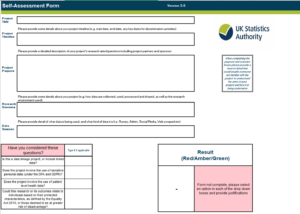If you’ve previously applied to use ONS Secure Access data with the UK Data Service you’ll be aware that part of the application process for data which is made available under the provisions of the Digital Economy Act includes showing you’ve considered the ethical implications.
The UK Statistics Authority’s (UKSA) Centre for Applied Data Ethics has developed an ethics self-assessment online tool to enable accredited researchers and analysts to quickly assess their use of data against the UKSA’s ethical principles and identify and mitigate ethical risk. The update comes in response to feedback from the user community, who were offered opportunities to share their views throughout the project.
The consultation made clear that researchers completing ethics self-assessments required more support when applying trickier subjective ethical considerations to their projects. They suggested the Centre for Applied Data Ethics needed to assess the accessibility and usability of the tool to make it easier to use. The changes have culminated in a totally new look for the online tool and simplified framework for researchers to identify ethical risks within their work.
What is the purpose of the tool?
The ethics self-assessment process offers researchers without other means for ethical approval, an easy-to-use framework to review the ethics of their projects throughout the research cycle. The process aims to support an accurate and consistent estimation of the “ethical risks” of research proposals when accessing data through trusted research environments (TREs), such as the UK Data Service SecureLab, but the tool can also be used by analysts in any setting, including academia, across government and the commercial sector.
So, what changes have been made to the tool?
The changes split into three broad categories, which were identified as a part of the original user review. These categories are: navigating subjectivity, guidance, and accessibility.
- Navigating Subjectivity
In the old tool, the scoring system was based on a Likert-scale, meaning that for each item, users had to score the ethical risk from 1 through 5. Users stated it was often hard to differentiate between each of the scores.
To solve this, it was decided that statements should be provided in a drop-down selection format. This allows users to select the most applicable option for their work, instead of trying to figure out what number on the scale applies to them.

- Guidance
Within the tool, researchers are required to complete boxes to explain why a certain score has been selected, but users felt that it was too difficult to understand what was expected from the justification. To make it easier, we have implemented a guidance column into the self-assessment form, which will explain to users what is expected from the justification, based on the statement they selected for that item. This will enable accurate completion of the form in a more efficient manner.

- Accessibility
The user consultation phase also identified potential improvements to the user experience of the tool. This primarily related to the ease of use, which led to changes to formatting, the size of the justification boxes, prompts throughout the tool and the removal of duplications to improve accessibility.
Is there guidance available?
Absolutely! This is something that UKSA updated in parallel with the changes to the form and can be found in both a html and PDF format so that it is accessible for all audiences. The guidance is extensive and provides an overview of the tool as a whole, and is then followed by lower-level explanations for each of the items that make up the form.
Users should note the other guidance from the Centre for Applied Data Ethics focuses on cross-cutting ethical issues. These include articulating the public good, geolocation data, the inclusivity of data and many more.
If I have further questions about the tool, who can I ask for more help?
For further questions on the tool, please get in contact with data.ethics@statistics.gov.uk
